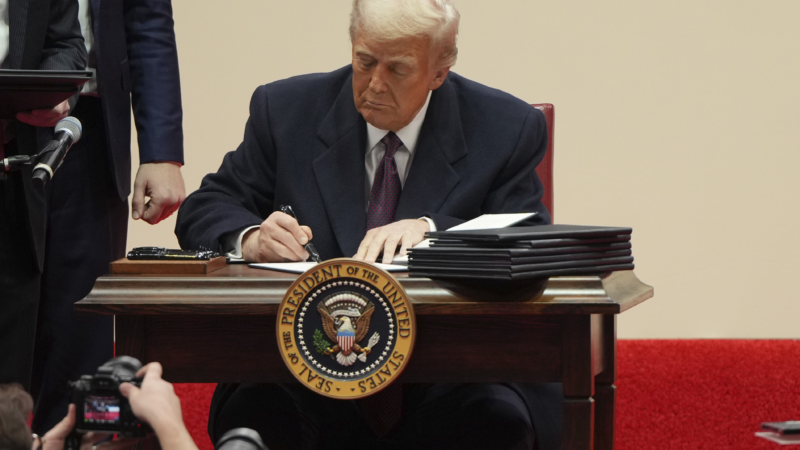Trump took down police misconduct database, but states can still share background check info
A federal system for doing background checks on law enforcement officers has gone offline — thanks to an executive order signed by President Trump when he returned to the White House on Jan. 20.
The National Law Enforcement Accountability Database (NLEAD) was launched in 2023 as a central repository of the professional records of federal law enforcement officers. The main purpose was to allow prospective employers — other federal agencies or local police — to check their backgrounds for misconduct. The system is now offline.
Why did President Trump decommission the database?
It appears to be a casualty of Trump’s flurry of first-day executive actions, which included the revocation of a long list of President Biden’s executive orders. One of those Biden orders was a package of police reforms signed on May 25, 2022, the second anniversary of the murder of George Floyd. The database was just one item among many in Biden’s order, and the Trump administration has not criticized it specifically, though in the preface to the revocation it criticized the Biden policies in general over what it called “unlawful and radical DEI ideology.”
Neither the White House nor the Justice Department has responded to NPR’s request for an explanation for the decommissioning of NLEAD.
Will this make it harder for law enforcement agencies to catch job applicants with problems in their past?
Yes, especially when officers move between federal agencies. The Biden administration had hoped this would also allow local police departments to check the records of former federal officers, and now that won’t happen. But when local departments hire officers with previous experience, they usually come from other state and local agencies, not from the federal government. And another system, called the National Decertification Index (NDI), allows departments to check officers’ records in other states.
Interest in the NDI has mushroomed in recent years, bolstered by concerns about “wandering cops” — officers who commit misconduct in one jurisdiction, then hide that history when they apply for new jobs elsewhere. Brian Grisham, who helps to run the NDI, says in the last five years the percentage of police departments using their background check system has risen from 23% to 71%.
“[It’s] the public and law enforcement demand for accountability,” Grisham says. “We’ve been around for 25 years and I’ve seen it grow from 30-something states to all states participating.”
Could the Trump Administration take down the NDI background check system, too?
Not likely. It’s run by IADLEST, a membership group for state police standards organizations, which isn’t controlled by the federal government. Grisham says it has received federal grants, as it’s expanded, but doesn’t depend on federal money to operate.
Is the White House reversing other aspects of Biden’s 2022 “police accountability” executive order?
The order was a grab-bag of measures that Biden signed, partly in frustration with Congress, which failed to pass the more sweeping “George Floyd Justice in Policing Act.” Since it was an executive order, its scope was limited to federal law enforcement agencies, and many of the provisions are about setting standards and writing policies. Many of those are in place by now, and they won’t necessarily be thrown out just because the executive order calling for them was revoked.
One example of this is the call for federal agencies to have policies for using body-worn cameras. Agencies contacted by NPR — the U.S. Marshals and Immigration and Customs Enforcement — say the camera policies remain in force, despite the Trump order revoking the original Biden order setting them up.
The hidden cost of oil: Families fractured by a pipeline project
As the 900-mile East African Crude Oil Pipeline project takes shape in Uganda, there is the promise of economic benefit. But it's shaking up the lives of some 100,000 people.
What’s the best Pixar movie? Here’s what our listeners said
People have strong opinions about the best Pixar movies. We asked NPR Pop Culture Happy Hour listeners to vote.
Why some see the dollar’s drop as a sign America is losing its financial might
The dollar has just posted its worst first-half of a year since 1973. And now investors wonder — is it a sign that America is losing its financial standing?
‘The worst day of my life:’ Texas’ Hill Country reels as deaths rise due to floods
Dozens of people have died in the Texas Hill Country. Scores of others are missing or unaccounted for. As rescue crews continue to search for victims, those who survived are coping with the loss.
Trump plans to share new tariff rates this week as deadline for deals approaches
The administration keeps shifting its plans when it comes to trade negotiations. The latest expectation is that most countries will receive new tariff rates this week that would go into effect on Aug. 1.
Are seed oils actually bad for your health? Here’s the science behind the controversy
Health Secretary RFK Jr. has said vegetable oils, like canola and soybean, are 'poisoning Americans.' But many researchers say the evidence isn't there. So, what does the science say about seed oils?









